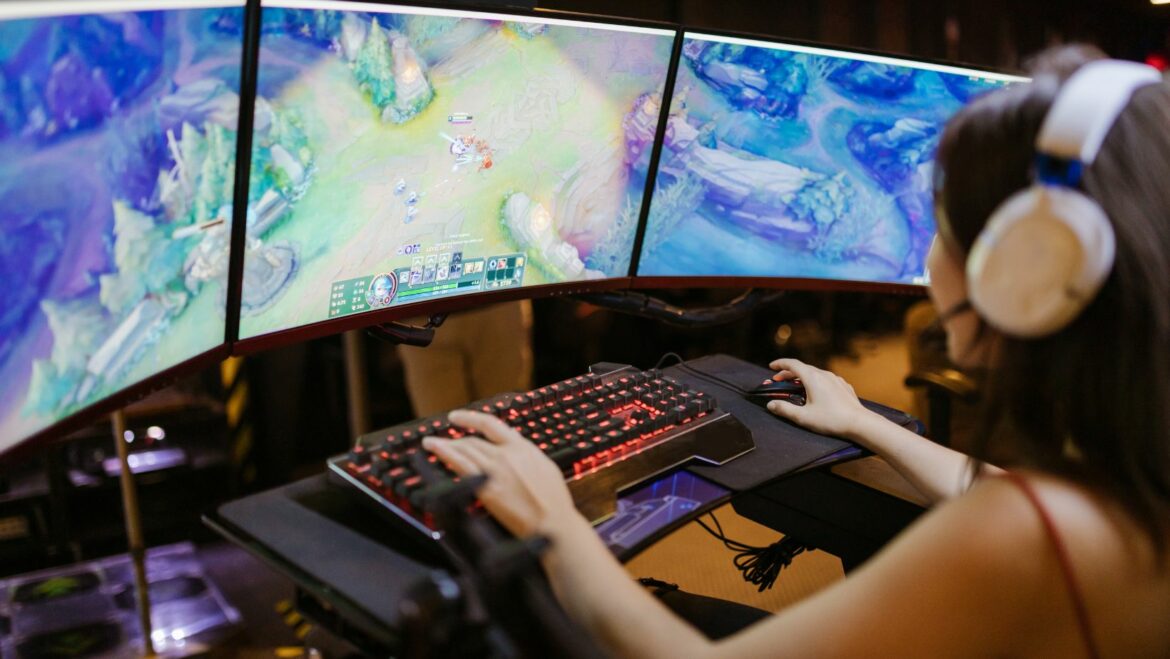Introduction
Ever wondered what it’s like to step into a digital playground where reality and imagination collide? Welcome to the captivating world of online gaming via personal growth, a realm that’s continually evolving and offering endless possibilities.
In this digital era, online gaming has emerged as more than just a pastime. It’s become a cultural phenomenon, connecting people across the globe and pushing the boundaries of technology. As we dive deeper into this digital playground, we’ll explore its intricacies, its impact, and the future it promises.
Join me as we embark on this exciting journey into the heart of online gaming. Let’s discover the magic that happens when we press ‘start’.
The Evolution of Online Gaming
Delving into the development of online gaming, it’s breathtaking how it transfigured from simple beginnings. The chronicle consists of several marked epochs that sculpted the journey of this digital playground.
The Dawn of Online Gaming
In the early 1970s and 1980s, the advent of online gaming occurred with rudimentary multiplayer games and MUDs (Multi-User Dungeons). These text-based adventure games, for instance, Zork and Adventure, laid a cornerstone in online gaming. However, the lack of graphical representation was a major limitation during this era.
The Rise of Graphical MMORPGs
Decades later saw the birth of graphical MMORPGs (Massively Multiplayer Online Role-Playing Games). The launch of games like ‘EverQuest’ and ‘Ultima Online’ in the late 1990s underpinned this shift. Vivid visual representation navigated a new direction, providing players with immersive gaming experience. Exceptionally, ‘slot gacor‘ and ‘slot RAJAGACOR’, even though not MMORPGs, showcased the swift ascend in immersive slot games, thereby contributing to the seismic shift in the gaming industry.
Mainstream Acceptance
The start of the 21st century experienced an extensive breath-through as online gaming breached the mainstream market. Large franchises like World of Warcraft and League of Legends punctuated the landscape, each earning millions of players worldwide. Proving how online gaming is not an electronic niche but a universally endorsed entertainment medium.
The Mobile Gaming Boom
Fast forward to the later part of the post-2010 era, online gaming leapt onto mobile devices. The rise of smartphones and tablets ushered in the mobile gaming boom.
Games such as ‘Candy Crush Saga’ and ‘Angry Birds’ became household names. Even traditional genres like ‘slot RAJAGACOR’ reinvented themselves on mobile platforms, solidifying the mobile gaming revolution’s lasting impression.
The Impact of Online Gaming
Shaping internet culture and society at large, online gaming plays an instrumental part. Let’s delve into consideration the extensive reach and influence it bears.
Social Connections and Community Building
The surge in online gaming propels social interaction. Games foster camaraderie by offering collaborative experiences, connecting gamers worldwide. For instance, MMORPGs such as EverQuest or World of Warcraft nurture digital communities whose connections often transpire beyond gaming realms and across geographical barriers, providing a collective sense of belonging.
Economic Contributions
Online gaming also propels considerable economic growth. This industry currently generates billions of dollars annually, offering slew opportunities for developers, marketers, and artists alike. Its influence leaks into adjacent sectors, too. In the case of ‘slot RAJAGACOR‘, leveraging the mobile gaming trend, it managed to breathe new life into traditional casino games. This overlap between the gaming and gambling industry opened up new revenue streams, further contributing to economic expansion.
Educational and Cognitive Benefits
Lastly, online gaming doesn’t lack educational and cognitive merits. Games serve as cognitive workout stations, enhancing problem-solving abilities and encouraging strategic thinking. Minecraft, for example, promotes creativity and spatial reasoning. Studies also suggest the potential of MMORPGs like ‘World of Warcraft’ and ‘Guild Wars 2’ in fostering leadership and team-building skills. Therefore, online gaming isn’t just an entertaining pastime but also a platform for learning and cognitive development.
The Future of Online Gaming
In light of online gaming’s historical trajectory and present impact, my gaze now turns towards its likely future. That future seems bright, the path illuminated by revolutionary technologies such as Virtual and Augmented Reality (VR and AR), Artificial Intelligence (AI), and Blockchain.
Virtual and Augmented Reality
Virtual and Augmented Reality pose considerable possibilities for online gaming. VR fully immerses gamers in digital realms outside their physical environment, promoting a sense of realism unattainable through traditional gaming methods.

Remarkable VR games, such as ‘Half-Life: Alyx,’ reinforce the transformative potential symbolism. AR, on the other hand, overlays digital entities onto our real world, integrating virtual components with our everyday surroundings. ‘Pokémon Go’ exemplifies this shift, allowing players to catch virtual creatures in their neighborhoods. As technology improves, I anticipate a greater number of online games harnessing VR and AR, thus changing the gaming landscape.
Artificial Intelligence
Artificial Intelligence emerges as another game-changer for online gaming. AI facilitates the generation of non-playable characters (NPCs) with advanced learning capabilities, resulting in more challenging and unpredictable gameplay. Moreover, AI’s precise algorithms analyze gamer habits, adjusting game difficulty and strategy accordingly. With AI, online games could potentially become more lifelike and tailored to individual players’ skills.
Blockchain and Decentralized Gaming
Blockchain technology and decentralized gaming represent an intriguing new frontier in online gaming. Blockchain allows for transparent, secure transactions within games, and the decentralization principle promotes player-driven economies. In some instances, particularly in games like ‘CryptoKitties,’ players own individual elements in-game through Non-Fungible Tokens (NFTs). This successful integration of innovative technology in current online gaming suggests an exciting crossroad of the gaming world with the digital economy.
As this landscape evolves, blokpoint becomes essential in optimizing the discoverability of blockchain-based games. Blockchain SEO (Search Engine Optimization) is critical in this space, enabling these games to gain visibility among targeted audiences. By leveraging blockchain SEO techniques, developers can ensure that their games not only function securely and transparently but are also easily found by users interested in the benefits of decentralized gaming platforms.
Conclusion
So we’ve journeyed together through the digital playground of online gaming. We’ve seen its evolution from simple text-based adventures to the immersive, global phenomenon it’s become today. From ‘EverQuest’ and ‘Ultima Online’ to ‘World of Warcraft’ and ‘League of Legends’, we’ve witnessed how these games have shaped our culture, economy, and even our cognitive abilities. We’ve also delved into the mobile gaming revolution, with games like ‘Candy Crush Saga’ and ‘Angry Birds’ redefining the gaming landscape.
We’re standing on the brink of a new era, with VR and AR set to offer even more immersive experiences. AI is poised to take gameplay to new heights, while Blockchain technology promises secure, player-driven economies. The future of online gaming is not just promising; it’s exhilarating. As we move forward, I can’t wait to see how these technologies will further transform this digital playground we so love.





